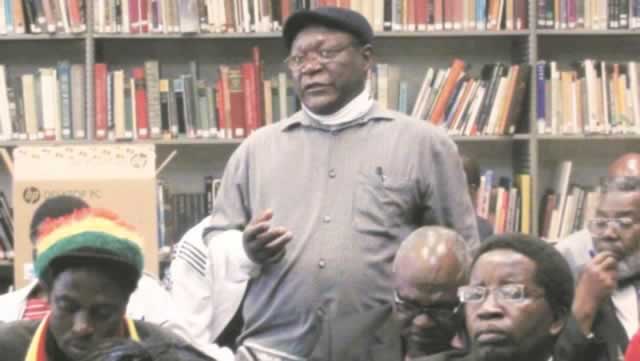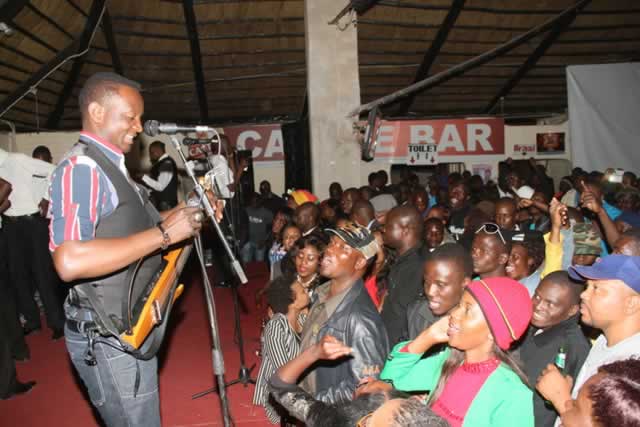Postscript: ZIBF getting back its mojo


MUSAEMURA ZIMUNYA . . . “The most obvious thing about our current society is that there is far less emphasis on reading for the love of the book and a great deal more on reading for examinations – a disaster for our development as a nation,” says the ZIBF chairperson
Stanely Mushava Literature Today
ZIBF had big things rolling on a summative score. A major imperative which cannot be gainsaid though is re-engagement with the lukewarm public. Extensive marketing is the next port of call.
Zimbabwean literary enthusiasts will never walk alone. The beat of better days is in the air for the book sector.
While the industry is posting bleak prospects, the just-ended edition of the Zimbabwe International Book Fair affirmed stakeholders’ will to press forward.
The country’s premier literary fiesta convened authors, publishers, academics, librarians, distributors, readers and policymakers from July 28 to August 2 under the banner “Indigenous Languages, Literature, Art and Knowledge Systems of Africa”.
ZIBF founding director Charles Mungoshi sent fraternal greetings from his native Manyene through his brother David Mungoshi, who was the toastmaster at the Literary Evening.
The jolly old writer intimated that he is in good health but would be happier if someone can donate him a set of false teeth because he has lost his.
Maybe Mungoshi personifies the festival he founded along with Phyllis Johnson and her late husband David Martin in 1983 – a giant toning up from infirmity. The book fair is on an ascendant trajectory once again after suffering a downturn in recent years.
More stakeholders are signing up while traditional players are hanging in there to prop up the embattled book value chain. Word from the exhibition booths was that several publishers are embracing the e-book as a stimulus for the country’s reading culture.
A fistful of new titles were in array including the Caine Prize for African Writing 2014 anthology, “The Gonjon Pin and Other Stories”, “Saskam Express” by Lilian Masitera and “Mukoma’s Marriage and Other Stories” by Emmanuel Sigauke.
The 31st anniversary of the book fair drew in participants other countries including Ghana, Tanzania, South Africa, Nigeria, Zambia, Kenya and Malawi and each edition of the Indaba registered at least 200 delegates.
ZIBF had big things rolling on a summative score. A major imperative which cannot be gainsaid though is re-engagement with the lukewarm public. Extensive marketing is the next port of call.
Stakeholder deliberations this year oscillated around the urgent need to revitalise Africa’s cultural apparatus out of the obscure patch they have been pushed into, thanks to globalisation and our own deflated self-awareness.
Despite the ephemeral duration of the ZIBF, its 31st anniversary was jam-packed with enduring nuggets which, given Government and corporate support, will be a timely lifeline for the book sector.
One issue, which is actually a given, is that Zimbabwe is way below the mark as far as the perpetuity of, much less the capacity to export, our indigenous culture is concerned.
The book sector, which is key medium to this end, is reeling from lack of visibility and Government has been notoriously unsupportive, if not complicit in the assault of the literary fraternity.
“Considering that Government needs books, you would have thought that they would prioritise capacitating the book sector – of which ZIBF is an intrinsic player – in order to boost the education and literacy sector. Unfortunately, as of now, nothing is happening,” ZIBF chairperson Musaemura Zimunya told Literature Today.
“With regard to the private sector, it is the same. At the moment, ZIBF is getting zero support from this sector. That we must depend on the philanthropy of foreign NGOs to fund patently national activities casts a very sad shadow over our sense of pride and logic,” he said.
Zimunya said despite its rocky start this year, the edition of the book fair was considerably successful. He said organisers will avail, in a few weeks’ time, areas of deficiency where improvements should be applicable.
“The presentations were inspiring, riveting, informative with regard to the role of mother-tongue languages in shaping our understanding of our world and beyond, in addition to providing an inexhaustible resource of infinite knowledge systems available for writers and publishers to exploit,” Zimunya said.
“We continue to review our activities in accordance with demands of the sector to the extent that we cannot begin to celebrate until we have achieved our targets, which is sustained growth and development of the book fair, in particular, spreading our vision to outward regions of this country,” he said.
Zimunya bemoaned the country’s lukewarm reading culture and commended adults take up reading as a way of setting an example for children who are currently thinking more about cellphones than books.
“The most obvious thing about our current society is that there is far less emphasis on reading for the love of the book and a great deal more on reading for examinations – a disaster for our development as a nation,” he said.
He haloed as a post-ZIBF take-home the observation that our worldview is predominantly shaped by our own languages, in spite of our desperate desire to belong elsewhere.
Assessing the low-key performance of the book sector, Zimunya pointed out the need to undertake multi-sectoral strategies to combat book piracy which he said are currently taking shape.
“We need to review penalties for ‘publishing,’ distributing and vending pirated materials prohibitive just as we have in the crime of stocktheft,” he said.
“Then intervention by Government through the provision of funding to education ministries for the purchase of books in schools in order to cut the life support system of barons of book piracy.
“In addition, there has to be a concerted campaign of informing the public about the evils of intellectual theft and its detriment to the writing and publishing of the same books they would like their children to have in schools,” he said.
Zimunya played down some exhibitors’ complaints that book fair organisers are not adequately marketing the event.
“I am not sure which publisher is saying this because publishers – as are other core stakeholders – are fully represented on our Executive Board and General Council where they can make suggestions as to how best to promote the event,” he said.
“In any case, before we run a book fair, all publishers are informed and it is up to them to use all strategies to market themselves. ZIBF does not market publishers – we only provide the platform!
“As a matter of fact, we only promote the event to the best of our abilities in the electronic media through interviews and advertising, which funds may not be adequate to fulfil our targets,” he said.
Last year we published some publishers’ complaints about low turnout at the Mutare Book Fair and their suggestions that ZIBF prepare marketing brochures for distribution countrywide through publishers who are in constant interaction with schools.
It was also suggested that ZIBF organise performance slots and reading competitions for rural schools as a way of broadening the operational reach of the book fair.
ZIBF is now making strides to this end. Southern African Research and Documentation Centre official Bridgette Mutengwa concurs: “There was a higher student turnout this year. Students came from as far as Murehwa, Mutoko and Uzumba.
“It seems students frequented stands more than adults but then they are the leaders of tomorrow so at least all is not lost,” Mutengwa said.
Zimbabwe Academic and Non-Fiction Authors schools co-ordinator Edwin Msipa said ZIBF worked hard to make this year’s book fair a success.
Msipa noted that students could have come in greater numbers if the education ministry’s interdict against extra-mural and co-curricular activities during weekdays was lifted with respect to the book fair.
College Press editor Phillip Mudzimba said it was good to see more stakeholders coming aboard compared to last year.
He, however, lamented that the usual people visit stands every year and sales are still low.
“I wouldn’t want to paint a gloomy picture, though. It’s just a phase. The fact that publishers are hanging in there with things hard as they are signifies optimism that things will turn for the better,” he said.
Linger awhile at The Bookshelf this Wednesday for a post-mortem of the book fair.









Comments